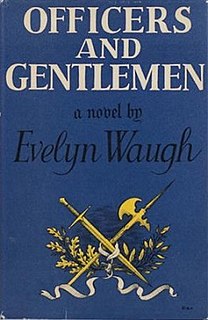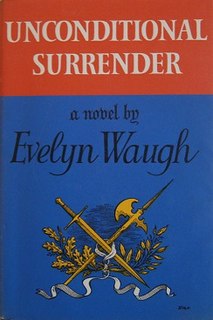
Fort Donelson was a fortress built by the Confederacy during the American Civil War to control the Cumberland River leading to the heart of Tennessee, and the heart of the Confederacy. The fort was named after Confederate general Daniel S. Donelson.

The final battles of the European Theatre of World War II as well as the German surrender to the Allies took place in late April and early May 1945.

The Battle of Fort Donelson was fought from February 11–16, 1862, in the Western Theater of the American Civil War. The Union capture of the Confederate fort near the Tennessee–Kentucky border opened the Cumberland River, an important avenue for the invasion of the South. The Union's success also elevated Brig. Gen. Ulysses S. Grant from an obscure and largely unproven leader to the rank of major general, and earned him the nickname of "Unconditional Surrender" Grant.
An unconditional surrender is a surrender in which no guarantees are given to the surrendering party. In modern times, unconditional surrenders most often include guarantees provided by international law. Announcing that only unconditional surrender is acceptable puts psychological pressure on a weaker adversary, but may also prolong hostilities. Perhaps the most notable unconditional surrender was by the Axis powers in World War II.

Dubravka Ugrešić is a writer born and raised in Yugoslavia. A graduate of University of Zagreb, she has been based in Amsterdam since 1996.
The French Revolutionary Wars continued from 1796, with France fighting the First Coalition.

The Casablanca Conference was held at the Anfa Hotel in Casablanca, Morocco, from January 14 to 24, 1943, to plan the Allied European strategy for the next phase of World War II. In attendance were United States President Franklin D. Roosevelt and British prime minister Winston Churchill. Also attending and representing the Free French forces were Generals Charles de Gaulle and Henri Giraud, though they played minor roles and were not part of the military planning. USSR General Secretary Joseph Stalin had declined to attend, citing the ongoing Battle of Stalingrad as requiring his presence in the Soviet Union.

The 1st Belorussian Front was a major formation of the Soviet Army during World War II, being equivalent to a Western army group.

The German Instrument of Surrender was the legal document that effected the extinction of Nazi Germany and ended World War II in Europe. The definitive text was signed in Karlshorst, Berlin, on the night of 8 May 1945 by representatives of the three armed services of the Oberkommando der Wehrmacht (OKW) and the Allied Expeditionary Force together with the Supreme High Command of the Soviet Red Army, with further French and US representatives signing as witnesses. The signing took place 8 May 1945 at 21:20 local time.

The Battle of Appomattox Court House, fought in Appomattox County, Virginia, on the morning of April 9, 1865, was one of the last battles of the American Civil War (1861–1865). It was the final engagement of Confederate General in Chief, Robert E. Lee, and his Army of Northern Virginia before it surrendered to the Union Army of the Potomac under the Commanding General of the United States, Ulysses S. Grant.

Surrender, in military terms, is the relinquishment of control over territory, combatants, fortifications, ships or armament to another power. A surrender may be accomplished peacefully, without fighting, or it may be the result of defeat in battle. A sovereign state may surrender following defeat in a war, usually by signing a peace treaty or capitulation agreement. A battlefield surrender, either by individuals or when ordered by officers, normally results in those surrendering becoming prisoners of war.

The Siege of Jerusalem was a siege on the city of Jerusalem that lasted from September 20 to October 2, 1187, when Balian of Ibelin surrendered the city to Saladin. Though Jerusalem fell, it was not the end of the Kingdom of Jerusalem, as the capital shifted first to Tyre and later to Acre after the Third Crusade. Latin Christians responded in 1189 by launching the Third Crusade led by Richard the Lionheart, Philip Augustus, and Frederick Barbarossa separately.

The surrender of Imperial Japan was announced by Japanese Emperor Hirohito on August 15 and formally signed on September 2, 1945, bringing the hostilities of World War II to a close. By the end of July 1945, the Imperial Japanese Navy (IJN) was incapable of conducting major operations and an Allied invasion of Japan was imminent. Together with the British Empire and China, the United States called for the unconditional surrender of the Japanese armed forces in the Potsdam Declaration on July 26, 1945—the alternative being "prompt and utter destruction". While publicly stating their intent to fight on to the bitter end, Japan's leaders were privately making entreaties to the publicly neutral Soviet Union to mediate peace on terms more favorable to the Japanese. While maintaining a sufficient level of diplomatic engagement with the Japanese to give them the impression they might be willing to mediate, the Soviets were covertly preparing to attack Japanese forces in Manchuria and Korea in fulfillment of promises they had secretly made to the United States and the United Kingdom at the Tehran and Yalta Conferences.

Officers and Gentlemen is a 1955 novel by the British novelist Evelyn Waugh.

The last stage of the Falklands War was the surrender of the Argentine Governor at Port Stanley.
The Burning Mountain is a 1983 alternate history novel by Alfred Coppel. The key change in history in the novel is that the Trinity nuclear test of July 16, 1945 fails. Then the novel goes on to depict the outcome of Operation Downfall, the 1946 invasion of Japan by American forces.
By the Berlin Declaration of 5 June 1945, the four governments of the United States, Soviet Union, United Kingdom and France, acting on behalf of the Allies of World War II, jointly assumed "supreme authority" over German territory and asserted the legitimacy of their joint determination of issues regarding its administration and boundaries, prior to the forthcoming Potsdam Conference.

Unconditional Surrender is a series of sculptures by Seward Johnson resembling a photograph by Alfred Eisenstaedt, V–J day in Times Square, but said by Johnson to be based on a similar, less well known, photograph by Victor Jorgensen. The original statue was first installed in Sarasota, Florida, then was moved to San Diego, California and New York City. Other versions have been installed in Hamilton, New Jersey; Pearl Harbor, Hawaii; and Normandy, France.

On 4 May 1945 1830 British Double Summer Time at Lüneburg Heath, south of Hamburg, Field Marshal Sir Bernard Law Montgomery accepted the unconditional surrender of the German forces in the Netherlands, northwest Germany including all islands, in Denmark and all naval ships in those areas. The surrender preceded the end of World War II in Europe and was signed in a carpeted tent at Montgomery's headquarters on the Timeloberg hill at Wendisch Evern.

Unconditional Surrender is a 1961 novel by the British novelist Evelyn Waugh. The novel has also been published under the title The End of the Battle. Along with the other two novels in the series, it was adapted into a 2001 TV film with Daniel Craig.















